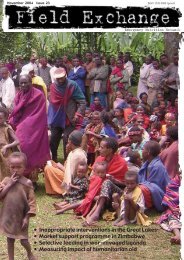Download a PDF of this issue - Field Exchange - Emergency ...
Download a PDF of this issue - Field Exchange - Emergency ...
Download a PDF of this issue - Field Exchange - Emergency ...
Create successful ePaper yourself
Turn your PDF publications into a flip-book with our unique Google optimized e-Paper software.
Research<br />
Acting in the face <strong>of</strong> risk<br />
Risk aversion and fear are widespread in<br />
humanitarian crises, as mistakes are <strong>of</strong>ten<br />
publicised and punished more than successes<br />
are rewarded.<br />
‘No ‘I’ in Team’– Trusting in others<br />
Many humanitarians do not delegate due to lack<br />
<strong>of</strong> trust and perceived consequences <strong>of</strong> poor<br />
actions, or the fear <strong>of</strong> losing their jobs by giving<br />
away their ‘technical expertise’. Encouraging<br />
others to act and take risks on your behalf is<br />
extremely difficult. However, it should be<br />
considered imperative for leaders in humanitarian<br />
organisations as <strong>this</strong> gives people confidence<br />
and demonstrates trust, which creates an even<br />
higher demand for people to act responsibly.<br />
‘Living on the Edge’– Decision making: risk<br />
taking and intuition<br />
In high-risk environments where there are more<br />
questions than answers, intuition plays a major<br />
role in humanitarian decision-making. “Your<br />
intuition tells you what is around the corner<br />
and how to take action with a number <strong>of</strong><br />
unknowns.” However, decisions should always<br />
utilise as much fact as possible and “common<br />
sense based on an understanding <strong>of</strong> the politics<br />
<strong>of</strong> where you are. Without that, you’re floundering<br />
around in the dark.”<br />
‘Rules were meant to be broken’– Organisational<br />
rules vs. humanitarian imperative<br />
Organisational rules set a general framework<br />
for action and decrease the risk <strong>of</strong> negligence<br />
and failure. But rules are sometimes too<br />
detached from the reality on the ground, and in<br />
emergency situations, when lives are at stake<br />
and the window for action is narrow, you sometimes<br />
have to break the rules to do what makes<br />
the most sense. “We are living by the rule <strong>of</strong><br />
humanitarian imperative, which might be in<br />
conflict with agency regulations.”<br />
Competent humanitarians need to have the<br />
personal strength to take critical initiatives both<br />
with creativity and speed. “In real emergency<br />
situations you have to balance getting the job<br />
done, ethics, transparency, and are you going to<br />
live with <strong>this</strong> the next day.”<br />
‘The road to hell is paved with good intentions’<br />
– personal values in testing environments<br />
“When you are first starting <strong>of</strong>f it’s all about<br />
ideals, humanitarianism and doing the right<br />
thing. With time, those ideals don’t hold up.<br />
You have to find your own way <strong>of</strong> reconciling<br />
these really big disparities. There’s a certain<br />
amount <strong>of</strong> hypocrisy that has to be reconciled.”<br />
Historical and social factors make each country<br />
different, and institutional structures, ethnic<br />
and religious rivalries can all test personal<br />
values. Corruption, for example, may not be<br />
seen as much <strong>of</strong> a problem in some societies,<br />
and bribery can be socially acceptable as a<br />
means <strong>of</strong> getting things done quickly. It is very<br />
easy to empa<strong>this</strong>e with the communities one<br />
works with or with a government <strong>of</strong>ficial,<br />
particularly when it gives access to key decision<br />
makers and project benefits are immediate.<br />
In these situations, humanitarians must stick<br />
to the ‘limits’ <strong>of</strong> their personal values. “A tough<br />
situation was witnessing a culture <strong>of</strong> corruption<br />
for one <strong>of</strong> the organisations I worked in. I was<br />
instructed to utilise stolen equipment, even<br />
after I pointed out to them that it was stolen.”<br />
One interviewee felt that, “a morally ‘purist’<br />
approach may not always be possible” while<br />
another felt you should “never break personal<br />
principles; you have to weigh whether the<br />
conflict breaks personal principles or if it is just<br />
an approach that can be resolved by swallowing<br />
some pride and compromising.”<br />
While values are context-bound and vary<br />
across cultures and individuals, there are limits<br />
in all cultures. Humanitarians should not<br />
support cultural norms that undercut the longterm<br />
stability and development a society hopes<br />
to achieve. “Humanitarians need to understand<br />
that an emergency is a rupture in the<br />
normal development <strong>of</strong> a country – and the job<br />
is to help it resume that development as soon as<br />
possible – so we have to understand long-term<br />
development and cultural contexts as well as<br />
short-term emergency efficiency contexts.”<br />
Sustaining energy<br />
‘What’s in there, you ask? Only what you take<br />
with you’ – <strong>Emergency</strong> response is not for<br />
everyone<br />
“While the mind can be very powerful, it can<br />
very easily break (or burn-out) in high-pressure<br />
situations. We owe it to ourselves to not walk<br />
blind into a wall <strong>of</strong> fire.” Being aware <strong>of</strong> your<br />
strengths and weaknesses helps you cope with<br />
the challenges <strong>of</strong> the job and avoid situations<br />
you cannot handle. “You need to understand<br />
who you are before you can throw yourself into<br />
<strong>this</strong> type <strong>of</strong> work. Nobody is effective on the<br />
ground if they collapse when personal problems<br />
surface due to extreme psychological<br />
stress.” For some humanitarians, the pressures<br />
induced by working in conflict and emergency<br />
environments are used as a driving force. “The<br />
pressure itself helps me. You see results faster, it<br />
makes you motivated, it helps you pull through<br />
and you have a goal to achieve. There is an<br />
adaptation to work under adrenaline. But you<br />
need to like pressure … if you don’t, you’re not<br />
cut out for humanitarian work.”<br />
‘You are what you eat’ – Preparation before<br />
entering the field<br />
Many respondents stressed the interdependence<br />
and importance <strong>of</strong> both physical and mental<br />
preparation. “Psychologically preparing yourself<br />
for the length <strong>of</strong> your assignment is critical.<br />
“I was in Darfur as an emergency coordinator<br />
for a few months, which was fine, because I<br />
knew it was a few months. It’s psychologically<br />
important to know duration, because if you’re<br />
in an intense location and don’t know how long<br />
you’ll be there, it’s draining.”<br />
‘Lean on me’ – Relying on colleagues to<br />
monitor stress<br />
Staff burnouts harm humanitarian relief operations<br />
because an individual’s quality <strong>of</strong> work<br />
can deteriorate to the point that there is a gap in<br />
operational capacity and a replacement is<br />
needed. Due to the lack <strong>of</strong> training and preparation,<br />
most humanitarians develop their own<br />
ad-hoc strategies to maintain themselves in<br />
crisis situations.<br />
Relying on and communicating with<br />
colleagues working under the same external<br />
pressures is fundamental in identifying your<br />
own levels <strong>of</strong> stress and coping with the pressures.<br />
“Make sure everyone on your team is<br />
doing OK … make a pact with a friend who<br />
would tell you if you are near to burnout.”<br />
Beyond symptoms <strong>of</strong> extreme stress, respondents<br />
identified indicators to know when<br />
colleagues are nearing a burnout point.<br />
“Reaching the edge, humanitarians <strong>of</strong>ten resort<br />
to over use <strong>of</strong> alcohol as a negative means to<br />
deal with stress, and people tend to become<br />
extremely ironical and sarcastic.”<br />
‘Leave the ball on the field’ – The importance <strong>of</strong><br />
disconnecting from work<br />
“People who have burnouts don’t detach themselves<br />
from a cause and don’t move on.” It is<br />
important for humanitarians to be efficient<br />
while at work, but to limit themselves, and once<br />
they leave, try to switch <strong>of</strong>f from their job.”<br />
While working in an emergency context, “You<br />
need to relax, know yourself, have something to<br />
do after work, have a comfortable place to<br />
stay.” Being able to find some peace after a hard<br />
day is easier said that done, but if you can<br />
empty your mind by doing something that has<br />
nothing to do with work, it helps to get the<br />
stress out <strong>of</strong> your system. This is particularly<br />
difficult for humanitarians, because shutting<br />
one’s mind to suffering is not easy. Mechanisms<br />
are diverse, and range from meditation, exercise,<br />
to reading a novel.<br />
‘The horror’– Dealing with trauma, one way<br />
or another<br />
The period following a difficult mission is just as<br />
significant as preparation in avoiding burnouts.<br />
One organisation had psychologists who do<br />
systematic debriefs <strong>of</strong> staff who are departing<br />
psychologically damaging work situations, but<br />
<strong>this</strong> support is not always effective for everyone,<br />
and informal channels need to be explored.<br />
Talking with colleagues, friends and family can<br />
help to express the traumas experienced.<br />
Conclusions<br />
Somewhere within <strong>this</strong> physically and psychologically<br />
demanding and politically complex<br />
environment is where humanitarians find<br />
themselves working and living day-by-day. As<br />
there are very limited training mechanisms,<br />
each humanitarian is <strong>of</strong>ten making their own<br />
way through the field, learning from their own<br />
mistakes and successes. Humanitarians have<br />
devised innovative (and sometimes unusual)<br />
practices to overcome the old and modern challenges<br />
<strong>of</strong> working in the humanitarian field.<br />
1. Maintaining meaning in work and life in<br />
order to sustain personal effectiveness and<br />
satisfaction.<br />
2. To convert stress into opportunity, positive<br />
framing was seen to project confidence and<br />
tranquillity on the team and encourage outsidethe-box<br />
solutions.<br />
3. Leveraging connections included developing<br />
informal community and interorganisational<br />
connections to maintain realtime<br />
updates in emergencies, and an ad-hoc<br />
system <strong>of</strong> mentoring as a source <strong>of</strong> information<br />
and inspiration.<br />
4. Learning to act in the face <strong>of</strong> risk is achieved<br />
through having a thorough understanding <strong>of</strong><br />
the local context to limit failure, knowing how<br />
to work around organisational rules, and<br />
understanding the limits <strong>of</strong> personal values.<br />
5. Sustaining energy is the most difficult aspect<br />
to control in emergency situations. It is a factor<br />
<strong>of</strong> personal character and self-awareness, physical<br />
and psychological preparation, relying on<br />
colleagues to monitor stress, disconnecting<br />
from work, and effectively dealing with trauma<br />
when it occurs.<br />
Through <strong>this</strong> study, we have seen that a<br />
humanitarian’s unique, individual practices<br />
can be combined to fit together within a larger<br />
framework maximising work effectiveness and<br />
personal satisfaction. Each humanitarian finds<br />
their own way to cope with the challenges they<br />
encounter, and keeping the balance is key.<br />
For more information, contact: Deborah<br />
Nguyen, email: deborah.nguyen85@gmail.com<br />
14
















